




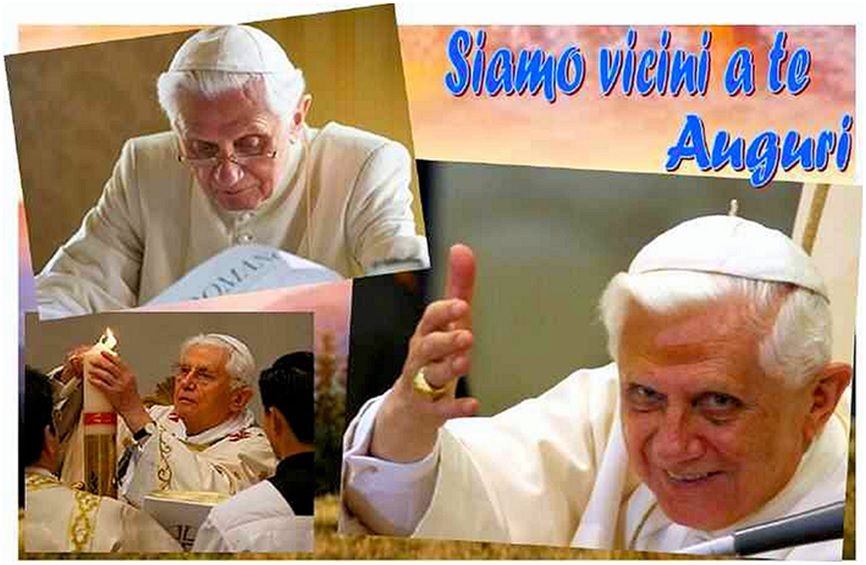
"WE ARE CLOSE TO YOU - BEST WISHES".
I am making use of the greeting collage above by Beatrice's faithful collagist Gloria from last year.



MORE THAN EVER -
ALL OUR LOVE AND PRAYERS
FOR OUR BELOVED BENEDICT XVI,
ROCK OF THE FAITH,
ON HIS 88th BIRTHDAY.
AD MULTOS ET FELICISSIMOS ANNOS!


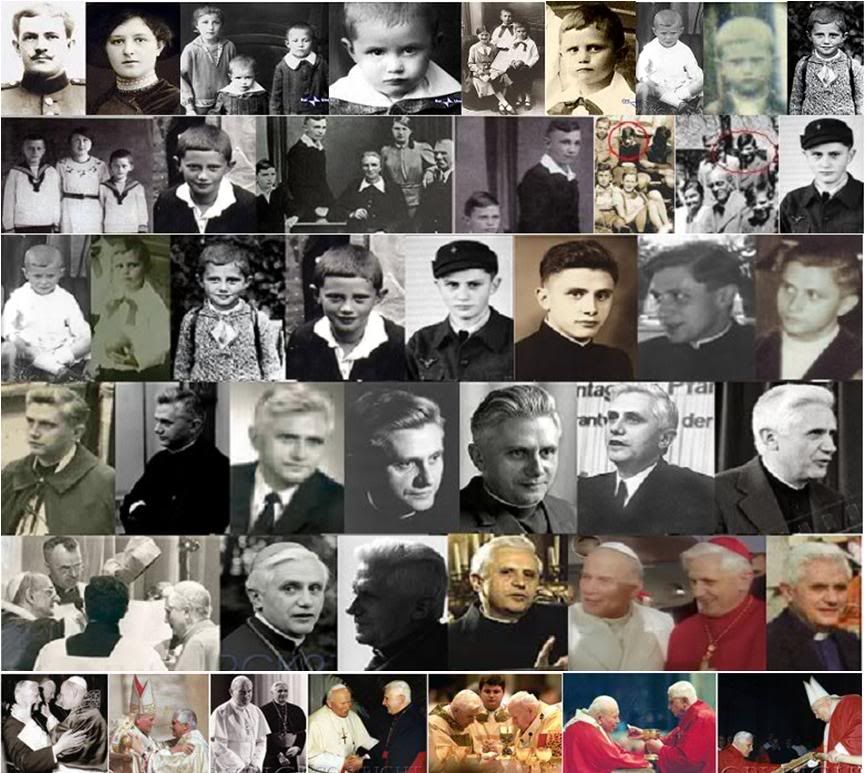





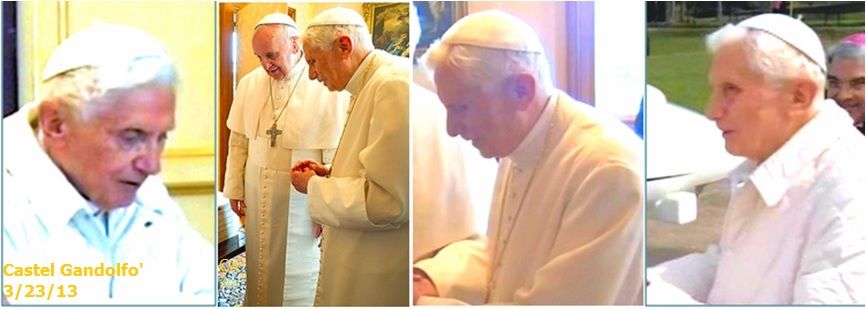

 Thursday, April 16, 2015
Thursday, April 16, 2015
 ST. MARIE BERNARDE (BERNADETTE) SOUBIROUS (France, 1844-1879), Visionary and Virgin
ST. MARIE BERNARDE (BERNADETTE) SOUBIROUS (France, 1844-1879), Visionary and Virgin
One of the most popular of modern saints, Bernadette was a virtuous and sickly peasant girl of 14 who had not even made her first Communion when 'a lady appeared to her on February 11, 1848, in a rocky grotto beside the river Gave in the Pyrenean village of Lourdes. She saw her 17 times more. The Lady identified herself on one of the earlier apparitions, 'I am the Immaculate Conception', a term which meant nothing to the unlettered girl. [Pope Pius IX would not declare the dogma of the Immaculate Conception until 1858). The Marian apparitions at Lourdes attracted worldwide attention. After initial skepticism, the Church gave credence to her story, and she soon was hounded for her fame. She entered a convent in Nevers where she worked humbly despite her chronic sickliness and professed her vows before she died at age 35. Meanwhile, Lourdes had grown into the most visited shrine on earth. Bernadette was canonized in 1935. When her body was exhumed before her beatification, it was found to be incorrupt and is venerated at the convent in Nevers.
Last year on this day...
Benedict XVI turns 87 -
Pope Francis calls to greet him
Translated from the Italian service of

April 16, 2014
The Church today joins Benedict XVI as he marks his 87th birthday. Pope Francis called the emeritus Pope by telephone to express his best wishes, assuring him that he prayed for him specially at Mass this morning.
Since this is Holy Week, Benedict XVI wished to spend the day with his usual meditations and prayers instead of any special celebration, according to a note from Fr. Federico Lombardi, director of the Vatican Press Office.
Joseph Ratzinger was born on April 16, 1927, in Marktl am Inn, a little town in Bavaria. He wrote about his early life in a book published when he turned 70 in 1997, but on various occasions during his Pontificate, he has spoken about his childhood, a couple of times to children...
In 2013...
Pope Francis offers prayer
and greets Benedict XVI
on his 86th birthday

April 16, 2013
On the occasion of Benedict XVI’s 86th birthday, the Holy Father, Pope Francis, began the celebration of Mass in the chapel of the Domus Santa Maria by inviting all present to pray for the Pope emeritus.
“Today is the birthday of Benedict XVI. Let us offer Mass for him, that the Lord might be with him, comfort him, and give him much consolation,” he said.
Later in the morning, Pope Francis called Benedict to offer him “best wishes” on his birthday. The Holy Father also greeted Benedict’s brother, Monsignor Georg Ratzinger, who has been staying at Castel Gandolfo to celebrate the occasion, and who, like Pope Francis [Jorge Mario Bergoglio] will celebrate his name day on April 23 – the feast of Saint George.
And three years ago, on Benedict XVI's last birthday as Pope...

 THE POPE'S BIRTHDAY HOMILY
Translated from
THE POPE'S BIRTHDAY HOMILY
Translated from

April 17, 2012
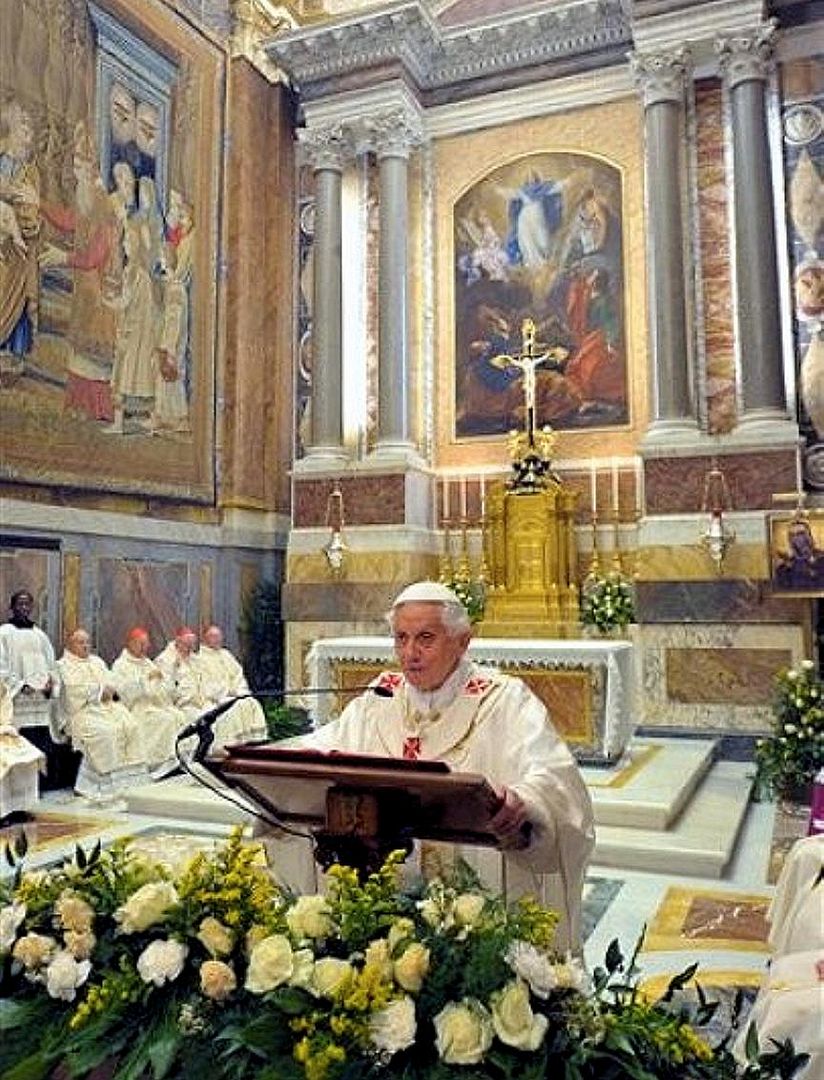
On the occasion of his 85th birthday, the Holy Father Benedict XVI presided yesterday morning at a Holy Mass concelebrated in the Pauline Chapel of the Apostolic Palace with his closest associates and a representative group of German cardinals, bishops and priests, including his brother Georg.
Here is a translation of the homily he delivered extemporaneously in German:
Dear Cardinals,
Dear Brothers in the Episcopate and Priesthood,
Dear Brothers and sisters:
The liturgy of the Church on April 16, my birthday and baptismal day, had three signposts that showed me where the road would lead and which would help me to find it.
First, there is the commemoration of St. Bernadette Soubirous, the visionary of Lourdes; then, there is one of the most unusual saints in the history of the Church, Benedict Joseph Labre; and above all, this day, always immersed in the Paschal mystery, the mystery of the Cross and the Resurrection - especially so in the year I was born, when it was Holy Saturday, the day of God's silence, of his apparent absence, the death of God, but also the day on which the Resurrection announced itself.
Bernadette Soubirous, the simple girl from the South of France, in the Pyrenees - we all know and love her. She was born in almost unimaginable poverty in 19th century Enlightenment France. A prison structure that had been abandoned because it was considered too unhealthy became the family home after much going back and forth, and that was where she spent her childhood.
She did not have much schooling, just some catechism to prepare for her First Communion. But this simple girl, who remained pure and innocent at heart, therefore had a seeing heart that made her able to see the Mother of the Lord. and in her, a reflection of the beauty and the goodness of God.
Mary could show herself to her, and through her, speak to her century, and to the centuries beyond hers. She could see with her pure and unspoiled heart. So Mary pointed her to the spring - so that she could discover this spring with its living, pure and uncontaminated water - water which is life, water which gives purity and health.
Through the centuries, this living springwater is a sign of Mary, a sign of where to find the waters of life, where one can become pure, where we can find what is not polluted.
In our time, when we see so much need in the world, in which the need for water - pure water - has emerged as a problem, this sign is all the more important. From Mary, from the Mother of the Lord, from her pure heart, comes pure uncontaminated life-giving water which purifies and gives us health.
I think we should also consider water an image for the truth that comes to us from faith: genuine uncontaminated truth. Because in order to be able to live, and to be pure, we need to yearn for pure living itself, for unfalsified truth, to be untainted by corruption, for a spotless existence.
Therefore on this day, this little saint has always been for me a sign of where the living water comes from, that which we need to purify us and give us life, and therefore a sign of what we must be - in all things, for all our knowledge and abilities, though they are necessary, we need a simple heart.
We should not lose the simplicity that makes the heart see what is essential, and we must always pray to the Lord so that he may keep in us the humility that allows the heart to be clear-sighted - to see the simple and the essential, the beauty and the goodness of God. Then we can always find the springs of purifying and life-giving water.
Then there is Benedict Joseph Labre, the pious 'beggar pilgrim', who after various vain attempts, finally found his vocation as a beggar - having nothing, no sustenance, never keeping whatever he received and what he did not need - wandering through Europe, to all the European shrines, from Spain to Poland, and from Germany to Sicily - a truly European saint.
We can say that he was a most unusual saint, who by begging, wandered from shrine to shrine, wanting to do nothing else but to pray and therefore give witness to what really counts in this life: God.
He is certainly not an example to emulate, but rather a road sign, a finger that points to the essential. He shows us that God alone is enough, that beyond everything in the world, everything that we need and everything we do, the decisive thing, the essential is to know God. He alone is enough, and this 'God alone' he showed us in a dramatic way.
At the same time, this truly European man who wandered the European continent from shrine to shrine showed that he who is open to God is not alienated from the world and from men. Rather, he found all men brothers because with God, all barriers fall - only God can do away with barriers, and with God, we are all brothers, we all belong to each other. Unity with God also means the brotherhood and reconciliation of men, bringing down barriers in order to unite and heal us.
And so, Benedict Joseph Labre was a saint of peace, because he was a saint who demanded nothing, who died with nothing, and yet was blessed with everything.
And finally, there is the Paschal mystery. On the day I was born, thanks to the foresight of my parents - I was also born again in water and the Spirit, as we have just heard in today's Gospel. First there is the gift of life, that my parents gave to me in a very difficult time and for which I must thank them.
But man's life itself is not always a gift. Can it really be a good gift? Do we know what can come to him in dark times, or even in the brighter times that may co,e? Can we say what troubles, what terrible events he may be exposed to? Can one just simply give life? Is it reasonable to do so or too uncertain? It is a questionable gift, by itself.
Biological life itself is a gift, but one that is surrounded by so many questions. it becomes a real gift when it is given with a promise that is stronger than every calamity that can threaten it, when it is immersed in a power that guarantees that - yes, it is good to be a man, that it is is good for this person whatever the future may bring.
Thus birth must come with rebirth - the certainty that, in fact, it is good to exist, since the promise is stronger than any threat. This is the sense of rebirth in water and the Spirit - to be immersed in the promise that only God can give: 'It is good that you exist, and you must know this for certain, whatever may happen'. I must live from this certainty, reborn of water and the Spirit.
Nicodemus asked the Lord: "Can an old man be born again?" Now, rebirth is given to us in Baptism, but we must continually grow in it, we must always allow God to immerse us in his promise, so that we are truly born again into the great and new family of God, which is stronger than all the weaker and negative powers that threaten us.
So this is a day to give great thanks. As I said, I was born and baptized on Good Saturday. At that time, the Easter Vigil was observed on Saturday morning, which would still be followed by the darkness of Holy Saturday, and so without the Hallelujah.
It seemed to me that this singular paradox, this rare anticipation of Light on a dark day, could be considered almost an image of the history of our time. On the one hand, there was still the silence of God and his absence. But there is already the anticipation of God's Yes in the Resurrection of Christ.
We live in this anticipation, and beyond the silence of God, we hear his voice. Beyond the darkness of his absence, we see the light. The anticipation of the Resurrection during a story that is still ongoing is the power that shows us the way and that helps us go on.
We thank the dear Lord that he has given us this Light, and we implore him that it may always be with us. I have reasons to give thanks on this day to him and to all who have always allowed me to feel the presence of the Lord and who have accompanied me so I may not lose the light.
I face the final stretch of my journey in life, and I do not know what awaits me. But I know that God's light is there, that Christ has risen, that the light of God is stronger than any darkness, that God's goodness is stronger than all the evil in the world. And that allows me to go on with certainty. It allows us to carry on, and at this time, I thank everyone from the heart who have given me the certainty of God's Yes through their faith.
Finally, I say to you, the dean of Cardinals - my sincere thanks for your words of fraternal unity, for your cooperation during all these years. And I say thank you to all the co-workers who in the 30 years that I have been in Rome have helped me to carry the burden of my responsibilities. Thank you. Amen.
 It was heartening to note in 2013 that Benedict XVI's first birthday as emeritus Pope was not overlooked by many in the Italian media, in this sampling of headlines from Lella's blog
It was heartening to note in 2013 that Benedict XVI's first birthday as emeritus Pope was not overlooked by many in the Italian media, in this sampling of headlines from Lella's blog

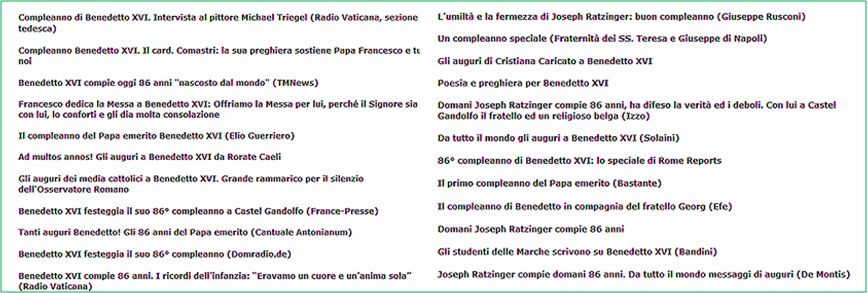
And this always relevant re-post:
I was re-reading Peter Seewald's September 2005 biography of Joseph Ratzinger entitled BENEDICT XVI: AN INTIMATE PORTRAIT, by a man who has known him since 1992, when he was first assigned to write a profile on someone he had to research thoroughly through what the media had written about him and from the testimony of his colleagues, friends and enemies. Eventually, he would come to produce two book-length interviews with Cardinal Ratzinger and the unprecedented sit-down interview with a Pope published in 2010 as LIGHT OF THE WORLD... In INTIMATE PORTRAIT, I keep being surprised by new details I had forgotten, so I thought I would quote some excerpts from time to time, in an opportune way. And I find that his very Preface is most opportune at this time, indeed almost prophetic, in his choice of what he emphasized in the Preface, which corresponds to the very themes evoked by the man who was elected to succeed Benedict XVI as Pope...
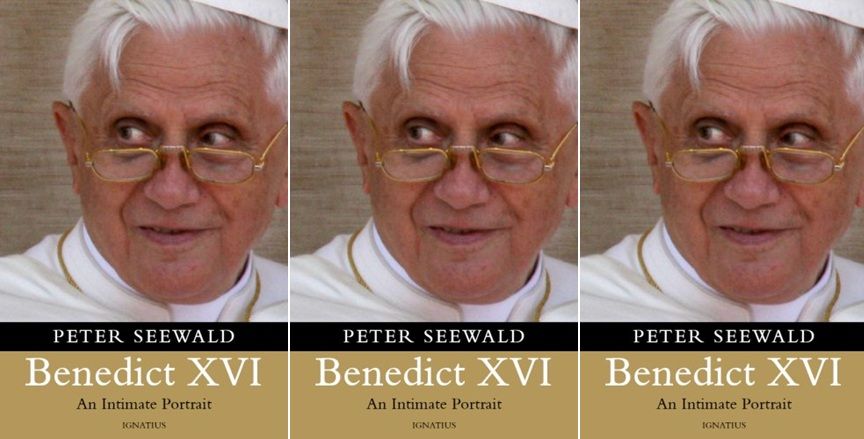
...I came to know Joseph Ratzinger as a great man for patience, as a spiritual master who can give answers. Here was someone who simply understood people, who had retained the liveliness of youth. Someone who did not burn out quickly but in some way remained whole - and most impressive in his attitude of humility, with which he makes small things in others seem great.
Joseph Ratzinger is a born teacher, but he did not want to become Pope. Even after the Conclave, on the loggia of St. Peter's, his face showed he traces of an inner struggle. And he probably felt like crying, so disturbingly moved was he by the condescension of the great God who entrusted him, at the end of his lifepath, with the keys of the kingdom.
The man from Bavaria - contrary to all the projections dumped onto his shoulders - is a revolutionary of the Christian type. Seeking out what was lost and saving it is the constant element in his life.
An inconvenient man who can seize on the spirit of the times, who warns people against the aberrations of modern life.
Anyone who really wants change, he cries out, needs a change in his consciousness and in his personal behavior - anything else is insufficient.
Now as Benedict XVI, the most powerful German at the beginning of the new millennium may offer a new opportunity for Europe, and especially, for his homeland.
Peter's Successor has given an exciting motto for this: That would mean something like a 'Benedictizing' [referring to St. Benedict] of the Catholic Church, a healthy revitalization of mercy, of the origin of the mystery. [Remember Seewald wrote this in 2005! And note the adjective 'healthy' used for the revitalization of mercy.]
This is an approach cased not on activism or considerations of feasibility, but on faith. And the Pontifex in Rome could find himself helped not only by a reawakened longing for meaning and a new consciousness that truth is indispensable, but also by a new generation of young Christians whose desire is to live out their faith in all its vitality and fullness once more, piously and without inhibitions. [We saw them in Cologne and Sydney and Madrid, and will see them in Rio... and very likely in our own parishes.]
"The Church is certainly not old and immobile", declared the new Pope enthusiastically [in his installation homily]. "No, she is young and alive".
It was also untrue, he said that young people are merely "materialistic and egotistic: young people want and end to be put to injustice. They want inequality to be overcome and for everyone to be given his share of the good things of the world. They want the oppressed to be given their freedom. They want greatness. They desire goodness. And that is why the young... are once again wide open for Christ".
And then he added, just like a rebel of earlier times, "Anyone who has come to Christ seeking what is comfortable has indeed come to the wrong address". And quite certainly, anyone who seeks that with Pope Benedict, too. [Words to remember everyday in these days of a welfare-state mentality even for God's mercy and forgiveness- 'All you have to do is ask and you shall receive'.]
- Peter Seewald
Abbey of Benediktbeuern
September 2005

Last year, ROME REPORTS greeted the Emeritus Pope with a little video on his past birthdays as Pope:
www.youtube.com/watch?v=Rqtew8I-BD4
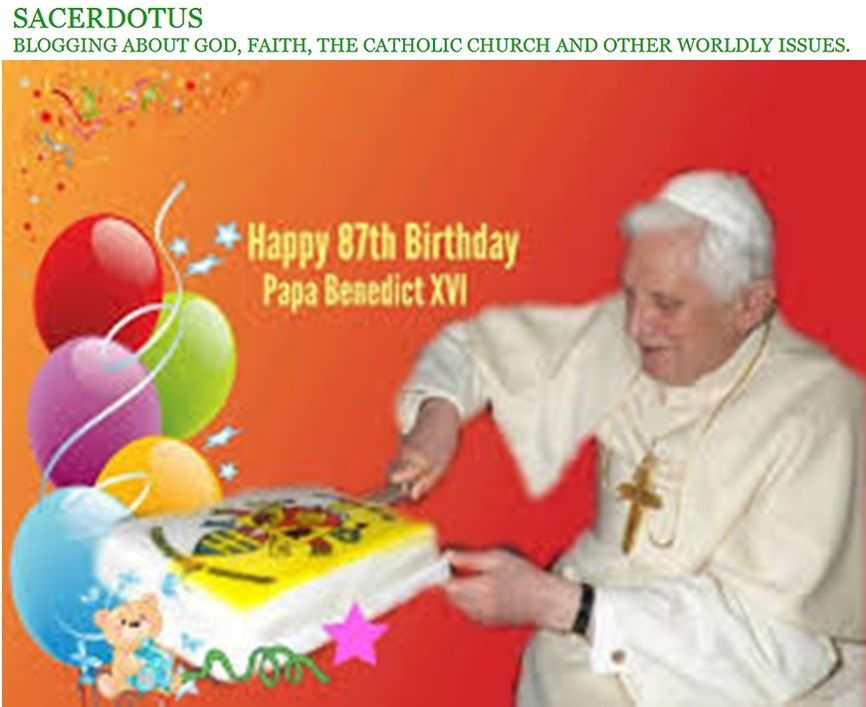
A priest who blogs as SACERDOTUS posted the above.
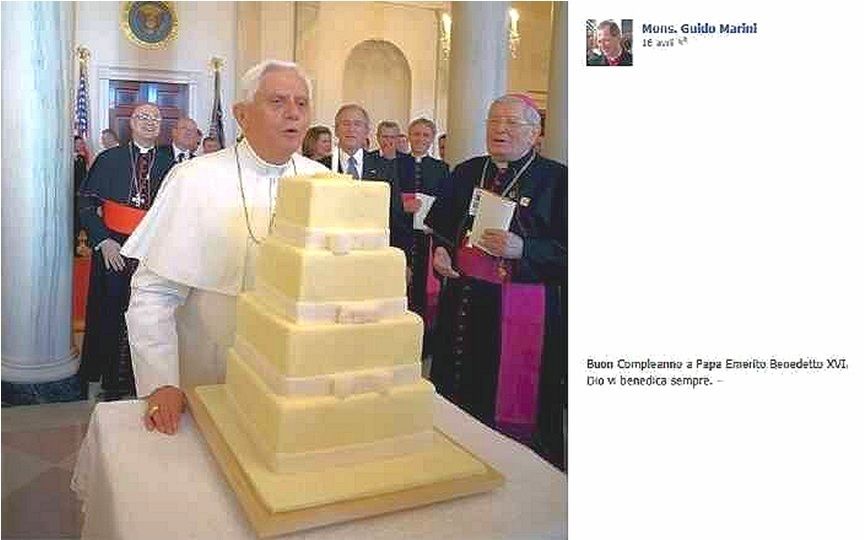
Mons. Guido Marini posted a birthday greeting on his Facebook page, using a photograph taken on Benedict XVI's 81st birthday, when President and Mrs. Bush greeted him with a birthday cake after the huge outdoor welcome for him in the White House South Lawn at the start of his apostolic visit to Washington, DC and New York in 2008.
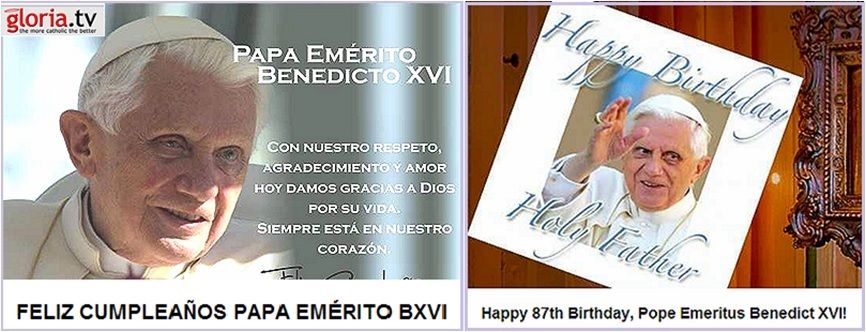
Two greetings on the site of GLORIA-TV.
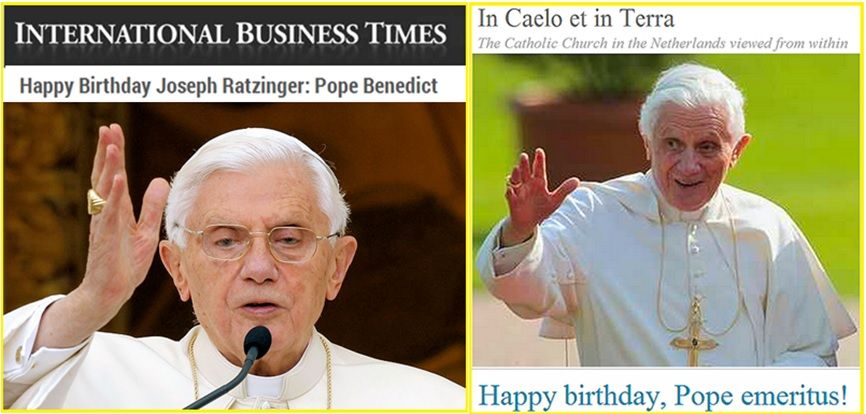
Left, from the UK-based International Business Times; right, from a Dutch blogsite.
While doing the search for birthday greetings this year, I came across this old item from April 2005, which I used during B16's visit to Australia for WYD 2008. It's a heartwarming little article that bears re-reading...
 Pope Benedict XVI's cousin
Pope Benedict XVI's cousin
By Felicity Dargan
 Archdiocese of Melbourne
Archdiocese of Melbourne
April 2005
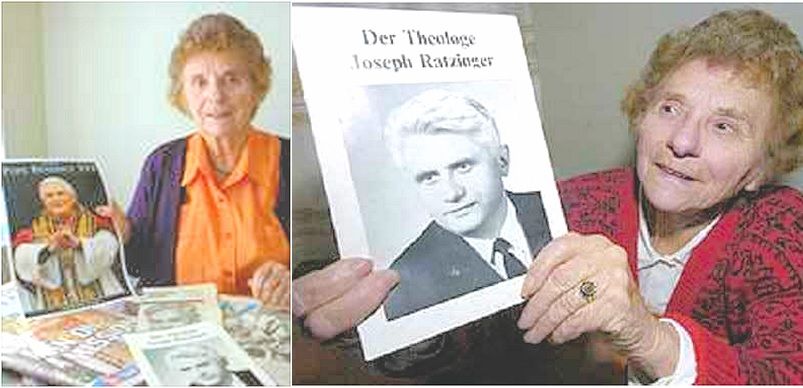
Pope Benedict XVI’s cousin, Erika Kopp, who lives in Blackburn South and migrated to Australia from Germany with her husband Karl in 1955, recalls visiting a shop with her then six-year-old cousin Joseph and her aunt.
“The shopkeeper was an elderly woman, and she asked Joseph, 'What are you going to be when you grow up?’ Mrs. Kopp said.
“He replied: ‘I am going to be a Bishop’.”
Mrs. Kopp, 79, was not surprised. “That was Joseph’s upbringing,” she said. “There was lots of prayer. His father was a high-ranking policeman, and before he went on patrol, he would always make the sign of the cross.”
So did the shopkeeper ask young Erika what she wanted to be when she grew up? “Yes”, she chuckled. “I said a baker, and I was. I worked in my father’s bakery shop.”
[Baking appears to be a continuing tradition among the Riegers, the maternal side of B16's family. His mother was raised as a baker's child, first in the Riegers' hometown in norhtwern Italy, then in upper Bavaria to where they moved.]
The events of the past few weeks have been overwhelming for Mrs. Kopp and her family. Karl died in 2003 at the age of 83, but she is close to her daughter Veronica, and three granddaughters: Laura, 28, Rebecca, 26 and Helen, 23.
A bright and active woman, Mrs. Kopp is delighted that her cousin has been chosen to lead the world’s Catholics and has full confidence in him.
“I think he is the best person,” Mrs. Kopp said. “His mental capacity is still as good as if he were younger.
“I feel very excited and proud. Joseph is such a good man, a simple man, very quiet. He is also such a controlled man, very exact, always on time. I don’t think he can help himself. His father was like that.
“Joseph has studied all his life, and this is the highest thing you can achieve. He was always so clever, such a strong thinker. That is a gift from God. Even as a little boy everyone realised, Joseph was a
Wunderkind ['child wonder', a prodigy].
“When we were children I said to Auntie (Joseph’s mother Maria), ‘I wish I could be as clever as Joseph’, and she always said ‘Erika, when you finish school, you will be able to count your money’.
“Auntie meant that I would be bright enough to get on in life. I’m not as clever as Joseph, but I’ve got a good IQ and I’m 79.”
Mrs. Kopp’s father, Benno Rieger, was the brother of Pope Benedict’s mother, Maria, and young Erika spent childhood holidays with Joseph and his siblings Georg and Maria.
“We have heard stories about Grandma’s cousin, the Cardinal, since we were kids,” Laura said. “It’s all a bit manic at the moment.”
Mrs. Kopp has since spoken to her 84-year-old brother, Benno, in Germany. She also has a sister in Germany, Flora, who is 82.
“Benno always thought Joseph would have a better life not being Pope,” she said. “When Joseph was called to Rome (on 25 November, 1981 he was made Prefect of the Congregation for the Doctrine of the Faith), everyone in Munich was worried that Joseph would be homesick because he and his siblings were so close and were being separated.
“When we were children, Maria, Joseph’s sister, used to say, ‘If Joseph becomes a priest I will cook for him.’ And that is what she did. Maria looked after Joseph in the Vatican. She never married. Joseph had an apartment, and Maria was like his housekeeper.
“When Maria died (on 2 November, 1991, aged 69) Joseph took it very hard. They were so close.”
Mrs. Kopp has many fond memories of childhood holidays with Joseph and his family.
“Joseph wasn’t a sportsperson,” she said. “They had all the music you could imagine and a big piano which Joseph and Maria played a lot. I rode Maria’s bicycle. Uncle spent all his money on their education, and Joseph attended a very exclusive school.
“Joseph’s mother did a lot for him. She was my sponsor when I was confirmed. She was very talented and a hard worker. She made Joseph stuffed teddy bears, animals, rabbits, whatever you can think. She made them by hand.
“I was at Joseph’s ordination (on 29 June, 1951), and he said, ‘Erika, I haven’t seen you for 14 years’. I would never have known how long it had been. Later he said to me, ‘Erika, I’ve still got my stuffed animals’.
“Auntie was also a very good cook. She made these wonderful preserved walnuts, and after our meal we were each given one.”
The childhood playmates last saw each other in 1985 when Mrs. Kopp visited Germany, and her cousin was Cardinal of Munich.
Mrs. Kopp proudly shows off clippings from German newspapers charting her cousin’s rise, along with a letter from her cousin, Maria, when Joseph was appointed Cardinal in June 1977.
Family and friends have suggested Mrs. Kopp visit her cousin in Rome.
“What would I say to a Pope?” she said. “I would say ‘Joseph, I am so proud of you. I hope God helps you carry this hard mission.”
 Forgive me that I was unable to come up with a brand-new birthday post this year - I had thought I would look back these days on Benedict XVI's unforgettable visit to the USA in April 2008, the first official day of which began on April 16, his 81st birthday, celebrated in style, courtesy of President George W. Bush, who arranged the largest White House garden reception ever for any visitor (12,000 invitees, compared to 8,000 for Queen Elizabeth) and later had Benedict XVI blow out the candles on a four-tier cake in Vatican yellow and white, before he and his wife had a private moment of prayer in the Oval Office with the spiritual leader of the world's Catholics (prompting many in the media to remark at the time that in many ways, Bush was US's first Catholic President; that he was, in fact, 'a closet Catholic'; and some even went so far as to predict that he might convert to Catholicism as his younger brother Jeb had done years earlier when the latter married a Mexican Catholic)...
Forgive me that I was unable to come up with a brand-new birthday post this year - I had thought I would look back these days on Benedict XVI's unforgettable visit to the USA in April 2008, the first official day of which began on April 16, his 81st birthday, celebrated in style, courtesy of President George W. Bush, who arranged the largest White House garden reception ever for any visitor (12,000 invitees, compared to 8,000 for Queen Elizabeth) and later had Benedict XVI blow out the candles on a four-tier cake in Vatican yellow and white, before he and his wife had a private moment of prayer in the Oval Office with the spiritual leader of the world's Catholics (prompting many in the media to remark at the time that in many ways, Bush was US's first Catholic President; that he was, in fact, 'a closet Catholic'; and some even went so far as to predict that he might convert to Catholicism as his younger brother Jeb had done years earlier when the latter married a Mexican Catholic)...
In any case, going through the 30 pages or so that we devoted at PAPA RATZINGER FORUM to the Pope's visit to the US and the UN was so engrossing for me - the reception given to Benedict XVI was truly amazing, but even more amazing was the media coverage and commentary - that I lost track of time. So to make up before the day is over for my tardiness, here's a precious snippet from the interview that President Bush granted EWTN's Raymond Arroyo on the eve of Benedict XVI's arrival in Washington, in which Bush explains why he was pulling out all the stops to greet and host Benedict XVI in many unprecedented ways (they had only met once before at the Vatican) ...
Mr. President, final question.
THE PRESIDENT: Yes, sir.
You said, famously, when you looked into Vladimir Putin's eyes you saw his soul.
THE PRESIDENT: Yes.
When you look into Benedict XVI's eyes what do you see?
THE PRESIDENT: God.
Good way to end the interview.
THE PRESIDENT: Thank you, sir.
Thank you, sir. My pleasure.
Another 'soundbite' about B16, this time from David Schindler, who has been the editor of the North American edition of
Communio since 1981:
When you read his homilies, they provoke you into thinking, and when you read his theology, it inclines you to pray. Simply, he does theology in the manner of the great saints and doctors of the Church -- a way of doing theology that is badly needed in our time.





[Modificato da TERESA BENEDETTA 18/04/2015 04:29]